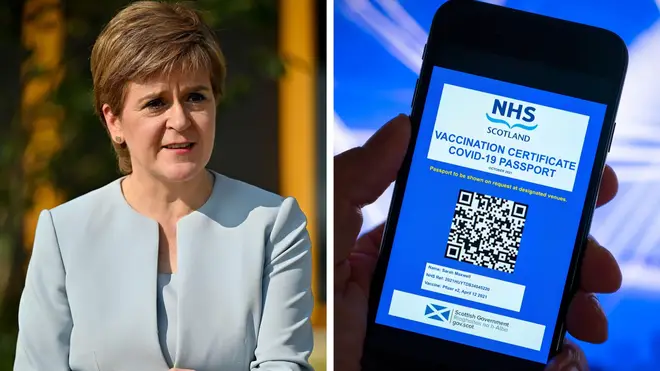
Matthew Wright 7am - 10am
18 October 2021, 16:32

The introduction of Covid passports in Scotland have been decried as “illiberal”, “discriminatory” and a “shambles”. LBC's Scotland Political Editor Gina Davidson gives her analysis.
Calls for their abolition have been made from the moment the Scottish Government’s plan passed into law back on October 1.
Now, after an 18 days grace period to allow affected businesses get the right equipment in place, and to ensure the vital app was working so the public have proof they have been double-jabbed, vaccine passports – or certification as Nicola Sturgeon prefers to call it – are legally enforceable.
Anyone pitching up to a nightclub, an indoor seated event or more than 500 people, an outdoor seated event of more than 4000 and any event which involves more than 10,000 people, will have to show proof they are fully vaccinated.
The move behind their introduction is twofold: to tackle Scotland’s rising Covid case numbers and to “encourage” younger people as yet unvaccinated to get their jabs.
Read more: Scottish authorities begin legally enforcing Covid passports for clubs and large events
Read more: Scottish vaccine passports come into force despite warnings scheme is 'double-edged sword'
Currently the main age group which has fallen behind in being double vaccinated are the 18 to 29-year-olds with the percentage sitting at 77.5 per cent.
But will it work?
The Scottish Conservatives think not. They don’t believe there’s been enough public awareness about the need for the Covid passports as only 700,000 apps have been downloaded and 750,000 Scots have a paper copy – many of those could be the same people – leaving two million without proof they’ve had their jabs.
Scottish Labour believes Nicola Sturgeon is “making it up as she goes along” and there should be a door-to-door scheme to convince those hesitant about the vaccine, while the Scottish Liberal Democrats say that rather than keep people safe the passports will “breed false confidence and allow the virus to spread under the radar.”
Even the Scottish Greens weren’t too happy about the idea stating the whole idea was discriminatory – until they were invited into government.
Read more: Iain Duncan Smith reveals chilling death threat days after killing of Sir David Amess
It is fair to say that Covid passports have so far proving to be one of the trickiest political moments of the pandemic for Nicola Sturgeon.
Her handling of the outbreak of the virus, and apparent ability to bring opposition politicians along with her when hard decisions were being made around lockdowns and mandatory mask wearing, allowed Scots to feel they were in capable hands – especially if the comparison was Boris Johnson, and even if the statistics around Covid cases, and sadly deaths, would suggest otherwise.
Presentation has been key – but also her public reliance on guidance from medical experts and the science.
However the introduction of the vaccine passports feels, to many, like a step in the wrong direction, one which might ultimately do more harm than good.
Professor Stephen Reicher, a behavioural psychologist who has been advising the Scottish Government has questioned their efficacy.
Read more: Former US Secretary of State Colin Powell dies from Covid-19
He thought No 10’s decision not to introduce them was the right one as they are a “double-edged sword” – accelerating uptake of the vaccine in those willing to be vaccinated, but “accentuating opposition in the sceptical".
Nicola Sturgeon has ploughed on regardless.
Affected businesses have also pointed out the problems – particularly as there is a shortage of door staff – and were furious at a lack of consultation on the whole idea.
Nicola Sturgeon ploughed on regardless.
The Scottish Human Rights Commission has raised a list of concerns including the lack of any demonstration by the Scottish Government that the scheme meets the key human rights tests of necessity and proportionality.
Nicola Sturgeon has still ploughed ahead.
The First Minister is utterly convinced that the introduction of the certificates will bring down Scotland’s rising case numbers – though she has also said that other stricter measures have not been ruled out.
To her, tackling the public health crisis is what matters – and the passports could also ensure no need for future lockdowns and the impact on the economy.
However unless there is a sudden upsurge in vaccinations and a coinciding fall in Covid cases, this decision could potentially be a major mis-step by the First Minister and rather than encourage more people to get their vaccinations, tap into a Scottish thrawn-ness which will result in exactly the opposite.